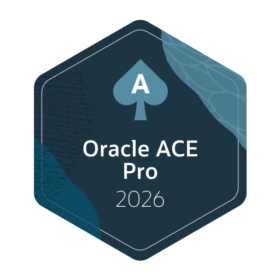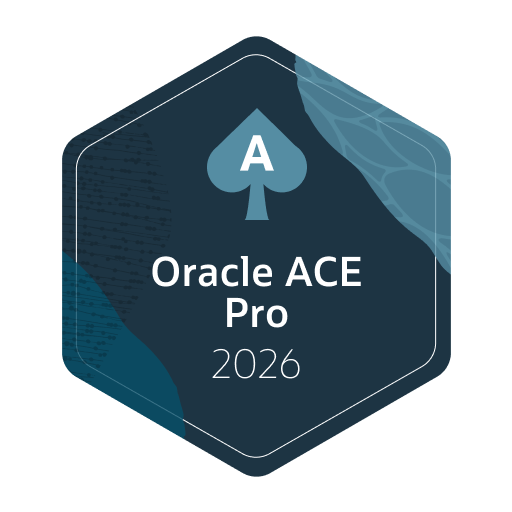Oracle ACE Pro
Oracle Solution Architect
Oracle E-Business Suite
Oracle Cloud Infrastructure
Oracle Fusion Middleware
Oracle Database Administration
Oracle Weblogic Administration
Oracle ACE Pro
Oracle Solution Architect
Oracle E-Business Suite
Oracle Cloud Infrastructure
Oracle Fusion Middleware
Oracle Database Administration
Oracle Weblogic Administration
Errors/Workarounds10g
ERROR
ORA-01157: cannot identify/lock data file 206 – see DBWR trace file
ORA-01110: data file 206: ‘+DATA’
SOLUTION
If you are using XML in your database and you are trying to update any XML data, then above error may come.
Step 1: Add below line in your parameter file and bounce the database if not there.
*.dispatchers='(PROTOCOL=TCP) (SERVICE=PRODXDB)’
Step 2: Unlock the XDB user if locked.
SQL> alter user XDB account unlock;
Step 3: If you have created a duplicate database or open standby database read/write mode, then source TEMP tablespaces will no more valid. drop your TEMP tablespace and create new TEMP tablespace and make it default.
SQL> DROP TABLESPACE TEMP INCLUDING CONTENTS AND DATAFILES;
SQL> create temporary tablespace TEMP02 tempfile ‘/u02/apps/ORCL/temp_02.dbf’ size 1024M autoextend on;
SQL> alter database default temporary tablespace TEMP02;
Bounce the database. Now sure the above error will not come.
How to Find and repair Corrupt block in database
Step 1: Below query will show if there is any corrupted block
SELECT *
FROM v$database_block_corruption — will show if any corruped block
Step 2: Below query can give you Detail information about corrupted block:
set head ON;
set pagesize 2000
set linesize 250
SELECT *
FROM v$database_block_corruption;
SELECT e.owner,
e.segment_type,
e.segment_name,
e.partition_name,
c.file#,
Greatest(e.block_id, c.block#)
corr_start_block#,
Least(e.block_id + e.blocks – 1, c.block# + c.blocks – 1) corr_end_block#
,
Least(e.block_id + e.blocks – 1, c.block# + c.blocks – 1) –
Greatest(e.block_id, c.block#) + 1
blocks_corrupted,
NULL description
FROM dba_extents e,
v$database_block_corruption c
WHERE e.file_id = c.file#
AND e.block_id <= c.block# + c.blocks – 1
AND e.block_id + e.blocks – 1 >= c.block#
UNION
SELECT s.owner,
s.segment_type,
s.segment_name,
s.partition_name,
c.file#,
header_block corr_start_block#,
header_block corr_end_block#,
1 blocks_corrupted,
‘Segment Header’ description
FROM dba_segments s,
v$database_block_corruption c
WHERE s.header_file = c.file#
AND s.header_block BETWEEN c.block# AND c.block# + c.blocks – 1
UNION
SELECT NULL owner,
NULL segment_type,
NULL segment_name,
NULL partition_name,
c.file#,
Greatest(f.block_id, c.block#)
corr_start_block#,
Least(f.block_id + f.blocks – 1, c.block# + c.blocks – 1) corr_end_block#
,
Least(f.block_id + f.blocks – 1, c.block# + c.blocks – 1) –
Greatest(f.block_id, c.block#) + 1
blocks_corrupted,
‘Free Block’ description
FROM dba_free_space f,
v$database_block_corruption c
WHERE f.file_id = c.file#
AND f.block_id <= c.block# + c.blocks – 1
AND f.block_id + f.blocks – 1 >= c.block#
ORDER BY file#,
corr_start_block#;
Step 4: Collect file ids
SELECT DISTINCT file_id
FROM dba_extents;
Step 5: Collect details
SELECT file_id,
segment_name,
segment_type,
owner,
tablespace_name,
block_id,
blocks
FROM sys.dba_extents
WHERE ( file_id BETWEEN 2 AND 19 )
AND 468598 BETWEEN block_id AND block_id + blocks – 1;
Step 6: Repair
a) Collect all data to temporary table and collect all DDL script and grants.
b) drop the table and re-create it with DDL script. (Disable refence key before drop, enable after create table)
c) Insert all records to the table
Note: This entire activity should not be taken in prod databases without Oracle support’s recommendation.
ERROR
Solution : ORA-01442: column to be modified to NOT NULL is already NOT NULL
sql> alter table HR.employees modify UID not null;
ORA-01442: column to be modified to NOT NULL is already NOT NULL
SOLUTION
ALTER TABLE table_name
ADD CONSTRAINT constraint_name CHECK(column_name IS NOT NULL);
OR
ALTER TABLE hr.employees
ADD CONSTRAINT nn_uid_hr_addrsdtls CHECK(UID IS NOT NULL);
RAC Files and Directories
$ORA_CRS_HOME/cdata/<cluster_name> |
OCR backups (default location) |
$ORA_HOME/log/<hostname>/client/ocrconfig_<pid>.log |
OCR command log file |
$ORA_CRS_HOME/crs/log |
contains trace files for the CRS resources |
$ORA_CRS_HOME/crs/init |
contains trace files for the CRS daemon during startup, a good place to start |
$ORA_CRS_HOME/css/log |
contains cluster reconfigurations, missed check-ins, connects and disconnects from the client CSS listener. Look here to obtain when reboots occur |
$ORA_CRS_HOME/css/init |
contains core dumps from the cluster synchronization service daemon (OCSd) |
$ORA_CRS_HOME/evm/log |
logfiles for the event volume manager and eventlogger daemon |
$ORA_CRS_HOME/evm/init |
pid and lock files for EVM |
$ORA_CRS_HOME/srvm/log |
logfiles for Oracle Cluster Registry (OCR) |
$ORA_CRS_HOME/log |
log fles for Oracle clusterware which contains diagnostic messages at the Oracle cluster level |


